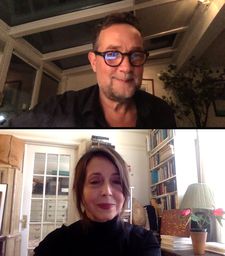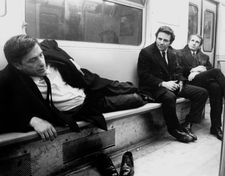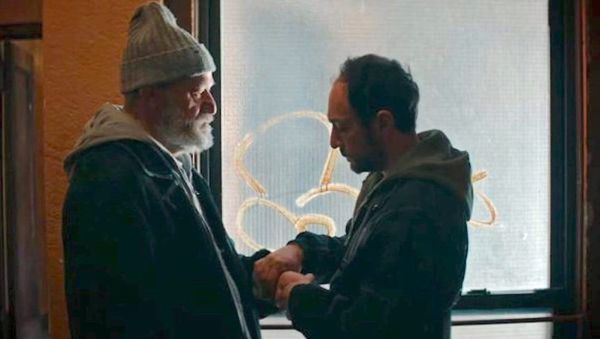 |
| Kakhi (Levan Tediashvili) with his troubled son Soso (Giorgi Tabidze) in Levan Koguashvili’s Brighton 4th, shot by Phedon Papamichael |
Cinematographer Phedon Papamichael has been in great demand by filmmakers and has worked with some of the most interesting storytellers, including Levan Koguashvili on Brighton 4th. Alexander Payne (Downsizing, Nebraska, The Descendants, Sideways), Aaron Sorkin (The Trial Of The Chicago 7), Judd Apatow (This Is 40), Oliver Stone (W.), and with James Mangold on Ford v Ferrari, Walk The Line (starring Joaquin Phoenix as Johnny Cash), Identity, 3.10 To Yuma, and the upcoming Indiana Jones 5.
From London, Phedon Papamichael took time off from his busy schedule on Indiana Jones 5 to discuss with me on Zoom his work on Georgia’s Oscar submission Brighton 4th (multiple winner in the 20th anniversary edition of the Tribeca Film Festival). Phedon has received Best Achievement in Cinematography Oscar nominations for The Trial of the Chicago 7 and Nebraska, which also earned him a BAFTA nomination, as did Ford v Ferrari.
Every face we see, in Tbilisi or New York’s Brighton Beach, every movement of a passer-by, every crumbling high-rise and cloud formation opens up the possibility of story. Phedon Papamichael’s compositions of reality are exquisite; the scenes make you think and feel and often laugh at the same time. When the film takes flight, Levan Koguashvili makes sure it also never loses its footing in quotidian reality. The range of insight, both in regards to cinematic traditions and the so-called real world out there, is large. “I wrestled all my life, how could I not wrestle for you?” says the protagonist, a true hero in a world so close to running amok.
Anne-Katrin Titze: Hi, where are you?
Phedon Papamichael: I’m in London, where are you?
AKT: I’m in New York.
PP: New York, very nice. I’m going to be in New York again soon, I think.
AKT: You’re filming right now Indiana Jones 5?
PP: I’m doing that, yes. And hopefully at some point that movie will come to an end.
AKT: It’s been going on for a while?
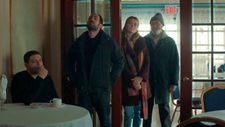 |
| Soso (Giorgi Tabidze) with Lena (Nadia Mikhalkova) and Kakhi (Levan Tediashvili) confronts his gambling debt |
PP: A very long time but we’re nearing the end and it’s going to be quite a spectacle. We’re all happy that we made it and are very proud of it.
AKT: And you are, I am sure, also very proud of Brighton 4th, which is such a beautiful film.
PP: Thank you.
AKT: Levan told me that he gave you as inspiration still lives by the Georgian painter Niko Pirosmani. Was that mainly for the first scenes, the ones at the market mostly or was it for the entire picture?
PP: That was mostly for the Georgian section. But I live in Georgia, so I’m familiar with Tbilisi. I actually have relocated there, my family lives there. I did my first Georgian film for this woman director, Nana Dzhordzhadze, called 27 Missing Kisses, which also went to Cannes [in 2000] and that was in 1999. So I’ve seen a bit of development and change and arch. It’s still deeply rooted in its traditions, but also has gone through tremendous changes, and this film also indirectly is dealing with all that. The adjustments of the society post-Soviet. Working class and lower middle class still struggling, the immigration to other countries, New York and Brighton Beach of course being the focus point for this film. Levan, as you know of course, he studied at NYU and made his first film on Georgian immigrants in New York.
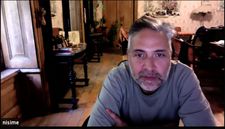 |
| Phedon Papamichael on Levan Koguashvili’s Blind Dates: “I like how he plays with the drama and the humor and it had the pacing and cinematic storytelling that reminded me of early Jarmusch …” |
AKT: Women from Georgia, which is great, yes.
PP: We’re tapping from a lot of our own experiences. You know, me being married to a Georgian, having lived in New York myself when I came to America under different conditions. But I did live on the Lower East Side, and moved in 1983 near Alphabet City, I mean it was rough. So I understand New York also quite well. Actually I hadn’t been to Brighton Beach before.
AKT: You hadn’t been before filming this?
PP: No, I mean, I’ve been to Brooklyn but never quite down there. I wasn’t aware that it’s almost like going in a time warp. It’s like mid-Eighties Moscow, the Russian community. We didn’t stay in a hotel or anything, we rented an apartment, we would eat at the local Georgian restaurant. Down the street there was an Uzbek restaurant. We were really swallowed and engulfed by this whole environment and of course that’s inspirational. I mean for me it was. Levan is much more familiar with it and he’s done a lot of research. It was inspirational for many reasons, because typically I do bigger Hollywood movies, studio films. And it’s very refreshing for me to dive into this independent world and especially a Georgian film.
I had met Levan in Karlovy Vary, I was actually on the jury when he was there with Blind Dates. I really responded to that film; I like how he plays with the drama and the humour and it had the pacing and cinematic storytelling that reminded me of early Jarmusch, which were great inspirations to me when I moved to America. Stranger Than Paradise and all that kind of tone. I felt very comfortable, although I’m dealing with a much smaller budget and an almost non-existent crew. It’s challenging for me to work with much less equipment and natural light and very tight locations. It was extremely tight, like the hostel they lived in. The rooms are like 8’ x 8’ and to get a camera crew in there …
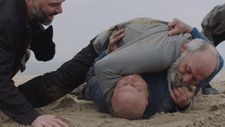 |
| Kakhi (Levan Tediashvili): “I wrestled all my life, how could I not wrestle for you?” |
AKT: Or the scene in the car! The kidnapping with the Kazakh guy and the woman fainting. It’s unbelievable and I remember thinking how on earth were you filming all that in such a crammed space for it to look that way.
PP: The scene in the car was actually one of the more technical setups, although it’s quite simple you would think, it’s just five people in a car. But the sun would come in and out and I had to cover it all. Levan didn’t really understand why I’m doing so much lighting. We were shooting all afternoon and he didn’t say anything because he didn’t really know in terms of technical things, but it seemed very complicated to him. It’s a great scene.
AKT: So is the very start; it’s so democratic. It’s wonderful that we don’t know whom we’re going to follow. There are all these fantastic faces that you show us briefly and then we move on to the next and there’s a guy who looks like Toni Servillo, but no, it’s not him. There’s one guy who has seen it all before, shot through someone else’s elbow.
PP: The faces and these portraits as you say, they are very important and the Georgian faces are so expressive and so melancholic and brazed. That’s always for a photographer, cinematographer, so rich what we can capture. I mean in Brighton Beach we were so tempted. We were always on a tight schedule, trying to complete the “scripted” scene. And Levan would always be like “Did you see that lady out there smoking? We got to get out and film her!” Capture all those people on the street. And I’m like, yeah we should, it’s great, but we also need to finish the scene that you actually wrote that takes place in the restaurant. And we only have the restaurant until six o’clock this afternoon, and then they kick us out.
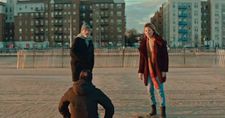 |
| Lena (Nadia Mikhalkova) and Kakhi (Levan Tediashvili) see a broken Soso (Giorgi Tabidze) |
AKT: And you still have to get the “Last Supper” shot, complete with tattoos and a masseuse!
PP: Exactly! That’s the scene I’m talking about. At the same time, just in front, actually on the boardwalk, were incredible little scenes to be found. Faces to be found, actual people just walking their dogs. It was a constant temptation to capture all of it. And Levan comes from a documentary background, so his instincts are to capture everything. He actually has issues when something feels constructed or written and the characters don’t feel real. That’s I think his biggest conflict as an artist.
AKT: The wonderful sense of humour in the real! I am thinking for instance of the two old people drinking their orange juice with a straw, while Kakhi is making burgers. Another scene I loved, which almost felt like Jean Renoir’s Rules of the Game, because there’s so much going on, is the one with the guy with the shoes behind the people eating. Foreground, background, so much is going on at once!
PP: It’s lovely and also a lot about authenticity and texture comes from working with amateurs. Sprinkling in Kakhi and the singer, who ends the movie, he’s a very established theatre actor who played Don Quixote in Soviet films. Then most of the characters in the hostel are amateurs. You really get magical things happening when you mix the actors the way Cassavetes did. He would rehearse scenes with Peter Falk and Ben Gazzara and himself and then create a dinner scene with eight other characters who really didn’t know what’s happening. And you get incredible performances because it’s real reactions and they would make people uncomfortable or catch them off-guard and their reaction would be genuine. So there’s a lot of that technique going on in this as well.
AKT: The music is used beautifully by Levan, especially for the scene at the end. Can you talk a bit about that and the four men in a doorframe?
PP: Yeah, that’s one of my favourite images. Especially the shot that ends up on their back. They fill this frame and create this wall. That was a really beautiful touching scene and very subtle in a way but so powerful at the same time. Very much in the Georgian spirit. To them they express their emotion through songs and toasts and drinking. That’s so much of their culture. They have a very famous toasting tradition. You don’t just say “To your health!” It always turns into a poem and tribute to somebody. It’s very much in Levan’s style.
He likes to not push the emotions. Subtle in a way the father passes away, you just see the boots tip up and that’s it. You’re not milking, you’re not pressing people’s buttons, you’re just kind of the way things happen in life. One second he is here and then he’s gone. Then the reaction is: Alright, I got all the guys together, I’m going to sing the song to him anyways for him, whether he’s dead or not. It’s not a created moment for cinema, that’s really what would have happened. They would have just sung it anyway. It’s great. It feels real and it’s still poetic and romantic, but also very realistic.
AKT: Which goes for much of the film. With that scene I was thinking of something I at first thought I wouldn’t even mention to you, because it’s silly, but it isn’t silly. I was reminded of Disney’s first full-length feature Snow White And The Seven Dwarfs, with them in the doorframe. It has a 1930s mood and it expresses their heartfelt pain for Snow White dying
PP: Interesting. I never thought of that. I’m glad you’re so perceptive to all the details in the movie. People watch movies so many different ways. It’s lovely that you’re in tune with all these details, it’s great.
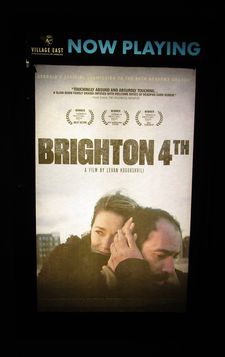 |
| Brighton 4th poster at Village East by Angelika Photo: Ed Bahlman |
AKT: Well, let’s keep in touch. Lovely to meet you!
PP: Yes, great. Very nice to meet you and thanks so much for the interest and all your support!
Coming up - Phedon Papamichael on working with Alexander Payne and being inspired by reality, production designers Shane Valentino (with whom he worked on Aaron Sorkin’s Trial Of The Chicago 7) and Adam Stockhausen (on James Mangold’s Indiana Jones 5), the family connection to John Cassavetes, Georgian cheeses and wine, directing Light Falls in Greece during the pandemic, music in New York and Los Angeles in the Eighties, and Phedon’s plans to create a film studio in Georgia.
Read what Levan Koguashvili had to say on his love of Italian Neorealism, working with the amazing Phedon Papamichael, Georgian painter Niko Pirosmani, Frédéric Boyer, Sophia Loren in Lady Liberty, Kakhi Kavsadze and when Georgian men sing, and the comedy of cheese.
Read what Levan Koguashvili had to say on the hearse, Brighton Beach shops, loving signs and the Strand Bookstore, Robert Frank, depth, levels, and action and The Big Lebowski.
Brighton 4th opened in New York at the Village East by Angelika on January 28 and opens in Los Angelos at the Laemmle Royal on February 11.
The final five nominees are scheduled to be announced on February 8, 2022. The 94th Academy Awards ceremony originally scheduled for Sunday, February 27 will be held on Sunday, March 27, 2022 at the Dolby Theatre in Hollywood.








